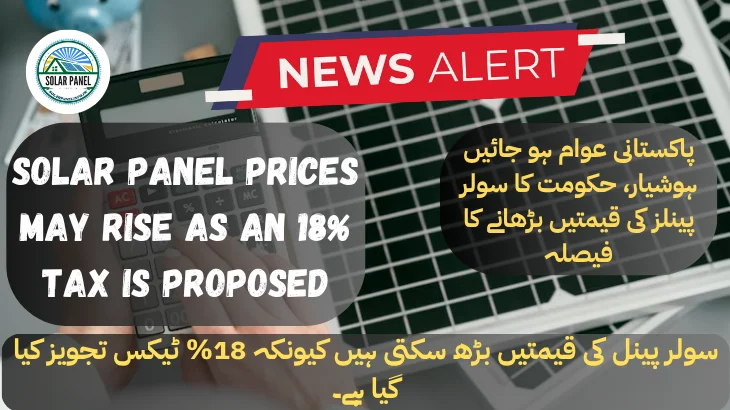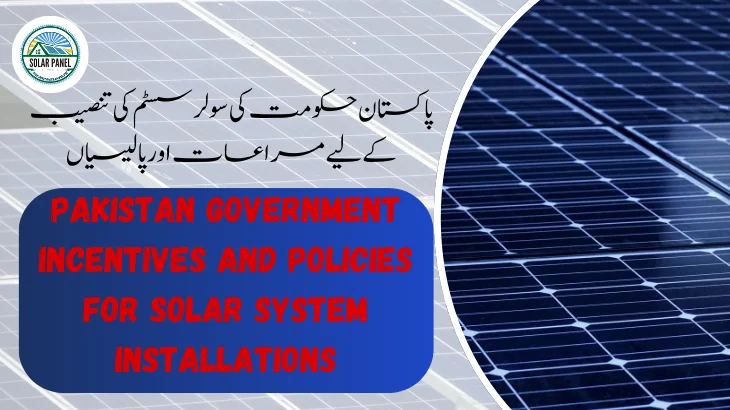Solar Panel Prices May Rise as an 18% Tax is Proposed
The Government of Pakistan has proposed an 18% sales tax on solar panels in the 2026–27 Budget, raising concerns about potential increases in solar energy costs. This plan is part of broader tax reforms to boost revenue and reduce the fiscal deficit. Still, it has sparked debate given the country’s growing focus on renewable energy and its commitment to green technologies. Here we will discuss the Solar Panel Prices May Rise as an 18% Tax is Proposed.
Read more: Solar Prices in Pakistan Fall After New Govt Policy

حکومت پاکستان نے 2026-27 کے بجٹ میں سولر پینلز پر 18% سیلز ٹیکس کی تجویز پیش کی ہے، جس سے شمسی توانائی کی لاگت میں ممکنہ اضافے کے خدشات بڑھ گئے ہیں۔ یہ منصوبہ محصولات کو بڑھانے اور مالیاتی خسارے کو کم کرنے کے لیے وسیع تر ٹیکس اصلاحات کا حصہ ہے، لیکن قابل تجدید توانائی پر ملک کی بڑھتی ہوئی توجہ اور سبز ٹیکنالوجیز کے لیے اس کی وابستگی کے پیش نظر اس نے بحث چھیڑ دی ہے۔
Govt Plans Tax on Imported Solar Panels
The federal government of Pakistan has proposed an 18% tax on imported solar panels, announced by Finance Minister Muhammad Aurangzeb during the Rs17.6 trillion budget presentation. The measure aims to create tax fairness and support local manufacturers.
Impact on Consumers and Installers
If approved, the new tax could increase the prices of solar panels and related equipment. Experts warn that this might discourage households and small businesses from switching to solar energy. More people have been considering solar power recently due to rising electricity prices and frequent power outages. Many solar installation companies are also worried. They say the added cost could slow down the growth of solar energy use in the country. The market, which had been growing steadily, may face challenges as affordability becomes an issue for average consumers.
Read more: Solar panel installation Plan.
Government’s Justification
In his budget speech, Finance Minister Muhammad Aurangzeb acknowledged the challenges we face but shared some positive news. He explained that this measure is important for supporting our local industries and improving tax collection. He pointed out that this tax could play a vital role in boosting our local solar manufacturing sector, encouraging us to produce more at home instead of relying on imports, and ultimately helping to create jobs for our community.
Industry Reaction
Renewable energy advocates are rallying for a bold shift in strategy! Instead of imposing taxes that could dampen progress, they’re urging the government to unleash a wave of incentives that would supercharge the transition to clean energy. “Taxing solar panels at this crucial moment is a misguided move,” declared a passionate solar energy expert. “It sends the wrong message to both investors and consumers when we should be championing sustainable energy solutions!” With several industry bodies already calling for urgent consultations with the government, the potential for immediate change is on the horizon. They’re sounding the alarm, insisting that we must rethink this proposed tax to avoid jeopardizing Pakistan’s ambitious clean energy goals.
Pakistan Focuses on Economic Growth After War Success
The finance minister highlighted the importance of a new measure to boost Pakistan’s domestic solar panel industry amid a historic budget presentation. He acknowledged the nation’s unity during the recent Pakistan-India conflict, congratulating the military and political leadership for their success. The focus is now on economic development, with economic stability achieved through reforms. Key achievements include a significant decrease in inflation and remittances totaling 36 billion dollars over the past ten months.
Conclusion
The suggested 18% tax on solar panel imports has sparked controversy throughout Pakistan, emphasizing the conflict between financial reforms and the drive for sustainable energy. Although the government claims this action will bolster domestic production and ensure tax equity, numerous experts worry it may hinder the advancement of solar energy adoption. As discussions about the budget proceed, various stakeholders are calling on policymakers to achieve a balanced strategy that fosters both economic development and environmental sustainability.
سولر پینل کی درآمدات پر تجویز کردہ 18 فیصد ٹیکس نے پورے پاکستان میں تنازعہ کو جنم دیا ہے، جس میں مالیاتی اصلاحات اور پائیدار توانائی کی مہم کے درمیان تنازعہ پر زور دیا گیا ہے۔ اگرچہ حکومت کا دعویٰ ہے کہ اس اقدام سے ملکی پیداوار کو تقویت ملے گی اور ٹیکس ایکویٹی کو یقینی بنایا جائے گا، لیکن متعدد ماہرین کو خدشہ ہے کہ یہ شمسی توانائی کو اپنانے کی ترقی میں رکاوٹ بن سکتا ہے۔ جیسے جیسے بجٹ کے بارے میں بات چیت جاری ہے، مختلف اسٹیک ہولڈرز پالیسی سازوں سے ایک متوازن حکمت عملی حاصل کرنے کے لیے زور دے رہے ہیں جو اقتصادی ترقی اور ماحولیاتی پائیداری دونوں کو فروغ دیتی ہے۔
FAQ’s
Will solar panel prices increase due to the proposed tax?
>>>Yes, if the government approves the 18% tax, it will increase the cost of imported solar panels, affecting overall installation expenses.
Why is the government imposing this tax?
The government aims to create a fair tax system and support local solar panel manufacturing while reducing reliance on imports.
Can this tax affect Pakistan’s green energy goals?
>>>>Yes, experts believe it could slow down the adoption of solar energy and make clean energy less affordable for many households.


